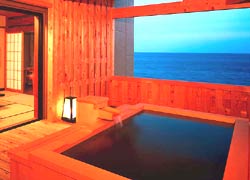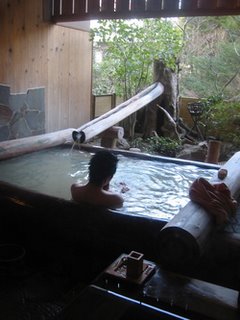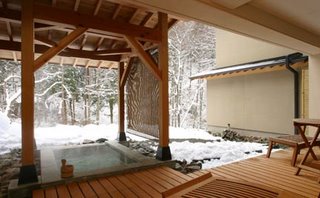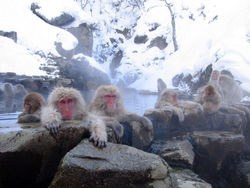Onsen - or being naked with other men
 Onsen is the Japanese word for hot spring. In fact the Kanji are 温泉, or 'hot' 温 and 'spring' 泉. Keeps it simple doesn't it?
Onsen is the Japanese word for hot spring. In fact the Kanji are 温泉, or 'hot' 温 and 'spring' 泉. Keeps it simple doesn't it?
Onsen are probably my favourite thing in Japan. Upon returning to England, or heading off somewhere else, they are probably the cultural institution I will miss most.
So yes... you get naked. Completely naked. In front of lots of other men (or women, if you're a woman - or just went in the wrong door... one time! it was one time only!). First you wash. This is what you do at home too: wash BEFORE getting in the bath. Kind of makes sense when you think about it - like taking your shoes off in the house.
First you wash. This is what you do at home too: wash BEFORE getting in the bath. Kind of makes sense when you think about it - like taking your shoes off in the house.
Next you get into the really hot water. Slowly, slowly... and then ... aaaa.... breathe. Your skin is tingling all over in the 40C water. You sit and soak in the wabi-sabi setting: clean wood, stone and deflected lighting. You sit and cook, your worries melting away. The setting is even better in an outside Onsen. (露天風呂) Beside a waterfall, in a cave by the sea, been bucketed by freezing rain: all these are settings in which I have had the pleasure of being quietly boiled.
The setting is even better in an outside Onsen. (露天風呂) Beside a waterfall, in a cave by the sea, been bucketed by freezing rain: all these are settings in which I have had the pleasure of being quietly boiled. In various places, such as 別府 (Beppu), you can also relax in hot volcanic sand, in red, green, blue water and even mud (for which they still provide showers in which to wash first!).
In various places, such as 別府 (Beppu), you can also relax in hot volcanic sand, in red, green, blue water and even mud (for which they still provide showers in which to wash first!).
Considering that Japan is basically built on plate-tectonic central, enduring 20% of the world's earthquakes, the amazing number and variety of Onsen is a pretty good cultural response to living on such a mess of volcanic activity. Onsen are are also a part of Japanese culture that, unlike many cultural things in many countries, is not maintained for the sake of tourism or simply for "tradition's sake": no lottery grants needed to keep this alive. Onsen are in other words, a distinctively Japanese cultural phenomena which real Japanese people like and enjoy - my favourite type of cultural phenomena.
Onsen are are also a part of Japanese culture that, unlike many cultural things in many countries, is not maintained for the sake of tourism or simply for "tradition's sake": no lottery grants needed to keep this alive. Onsen are in other words, a distinctively Japanese cultural phenomena which real Japanese people like and enjoy - my favourite type of cultural phenomena.
The photos are mostly off the net, apart from the one which begs the question, as Ollie put it: "What are you doing with the other hand?"

No comments:
Post a Comment